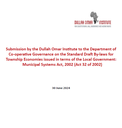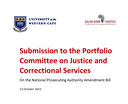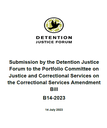This submission by the Dullah Omar Institute critiques the proposed National State Enterprises Bill, arguing that its centralised governance model may deepen existing challenges in South Africa's state-owned enterprises (SOEs). While the Bill rightly aims to strengthen operational efficiency and board accountability, it does so by centralising power in the Presidency through a holding company (SAMSOC), without sufficient checks, transparency, or stakeholder participation. The submission highlights the Bill’s lack of clear criteria for due diligence, accountability mechanisms, or transparent board appointment processes. Drawing comparisons with Singapore’s Temasek model, the Institute argues that transplanting such models without regard to South Africa’s constitutional and political context is misguided. The submission stresses that SOE reform must be rooted in the values of section 195 of the Constitution—particularly transparency, accountability, and public participation. It recommends dispersing decision-making powers, introducing objective and transparent criteria for board appointments, and ensuring meaningful stakeholder inclusion. The current draft, it warns, risks reinforcing oligarchic tendencies and undermining democratic oversight, rather than restoring public trust in SOEs.
This submission was made to the Department of Co-operative Governance on the Standard Draft By-laws for Township Economies issued in terms of the Local Government: Municipal Systems Act, 2002 (Act 32 of 2002) on 30 June 2024 | by Prof Lukas Muntingh, Prof Tinashe Chigwata and Janelle Mangwanda
Dullah Omar Institute statement on behalf of the Campaign to Decriminalise Poverty and Status in response to the activity report of the Special Rapporteur on Prisons, Conditions of Detention and Policing in Africa. This submission focuses on the challenges related to the criminalisation of minor or petty offences at sub-national level. The submission notes that in several African countries, local law enforcement agencies often enforce subnational laws in an arbitrary, discriminatory and violent way which infringes on fundamental human rights. It was further noted that there is a lack of strong and effective internal and external oversight and monitoring mechanisms to regulate the enforcement practices of subnational law enforcement agencies to protect people against human rights abuses. The submission also highlights the existence in several African states of quasi-state and private security agencies or vigilante groups with delegated powers to prevent crime, maintain public order, police the use of public spaces, and in some cases, effect an arrest. The challenge, however, is that the majority of these security agencies are populated by informally trained personnel and enforcement is conducted in a brutal manner and is often characterized by a lack of due process. In general, the submission recommends that the African Commission and the Special Rapporteur on Prisons, Conditions of Detention and Policing in Africa should urgently prioritise the role of subnational governments in their work to promote the decriminalisation of petty offences.
This submission was made by Africa Criminal Justice Reform (ACJR) to the NCOP Select Committee on Security and Justice on the Independent Police Investigative Directorate Bill (B21B – 23) on 1 February 2024
This oral submission was made at the Portfolio Committee on Justice and Correctional Services held public hearings on the National Prosecuting Authority (NPA) Amendment Bill on 25 October 2023
This oral submission was made at the Portfolio Committee on Justice and Correctional Services held public hearings on the Independent Police Investigative Directorate (IPID) Amendment Bill [B21-2023] on 25 October 2023
Dullah Omar Institute submission to Special Rapporteur on the right to adequate housing and the Special Rapporteur on extreme poverty and human rights - Call for Input: Decriminalisation of homelessness and extreme poverty
The Detention Justice Forum, to which ACJR is a Coordinating member, made a written submission to the Portfolio Committee on Justice and Correctional Services on the Correctional Services Amendment Bill B14-2023 on 14 July 2023.
Africa Criminal Justice Reform submission: The Judicial Matters Amendment Bill [B7-2023] in South Africa.
ACJR’s submission is in response to the call from the UN Special Rapporteur on extrajudicial, summary, or arbitrary executions (UNSR) to collect information on practices for the investigation, documentation, and prevention of deaths in custody in the criminal justice context. The UNSR’s report aims to raise awareness about deaths in custody globally and to contribute to the protection of the right to life of those deprived of liberty, including practical recommendations and best practices on the effective investigation, documentation, and prevention of custodial deaths. This submission focuses on South Africa and pays particular attention to custody situations under the control of the police and the Department of Correctional Services (DCS). The submission would inform the UNSR report to be presented to the Human Rights Council in June 2023.
This submission was made to the Subcommitee for the Prevention of Torture and Other and other Cruel, Inhuman or Degrading Treatment or Punishment (SPT) on 13 February 2023
It was reported from Guinea Bissau on 20 March 2023 that a new law will prohibit Islamic leaders using children for begging. The President of Guinea-Bissau, Umaro Sissoco Embaló ordered that from Monday, 27 March 2023, child mendicity will be prohibited and that fathers or Koranic teachers of any child caught begging in the streets of the country would be arrested. The President considers shameful to send children in the streets of Bissau and neighbouring countries to raise support for their Koranic teachers. The regular practice perpetrated by some Islamic leaders have created an alarming phenomenon nationally and in the region. As members of the global Campaign to Decriminalise Poverty and Status advocating for the repeal of laws that target people based on poverty, status or for their activism, we are, however, concerned for those children who beg on the streets not sent by their religious teachers, but forced by their economic and social situation. For those children, mendicity may be the only means of subsistence because the state may not have adequate social, economic and other relief measures in place to combat their poverty. The full joint statement can be found here.
![Submission by the Dullah Omar Institute to the National Assembly Portfolio Committee on Planning, Monitoring and Evaluation on the National State Enterprises Bill [B1 – 2024] Submission by the Dullah Omar Institute to the National Assembly Portfolio Committee on Planning, Monitoring and Evaluation on the National State Enterprises Bill [B1 – 2024]](https://admin.dullahomarinstitute.org.za/acjr/doi-submission-v-6-6-1-2024-a.pdf/@@images/e96335f1-32ac-4b39-a6d0-66b36bf758e3.jpeg)





